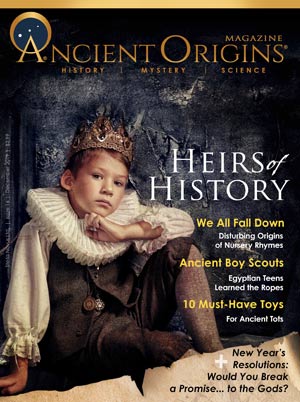
Over the centuries, historians have told us in detail about the rise and fall of civilizations, the leaders and rulers of our world, dramatic battles and magnificent monuments, but the history of children and childhood has been strangely absent.
The invisibility of children in history and archaeology is sometimes attributed to the scarcity of historical records relating to children, and artifacts that once belonged to them. Perhaps too has been the view that children are somewhat peripheral to the most important historical subjects.
In the last few decades, however, an understanding of childhood through the ages has begun to emerge, and researchers have started to shine a spotlight on this vital aspect of human history.
The archaeological and historical record provides opportunity for the exploration of numerous aspects of childhood – an ancient, ceramic baby bottle, a child-size weapon, tiny fossilized footprints, child ‘doodles’ in medieval manuscripts, nursery rhymes, and mythological tales – they all have stories to tell about the children of our past, and in this issue we examine these records and more, offering a glimpse into what life was really like for children throughout history.
Like children traversing a river by leaping from raised stone to stone, we hop, skip, and jump across fascinating topics. We speak with Daniel Farkas, the CEO of Drops, a language learning app that strives to preserve Ainu history by harnessing tech to teach their language before it disappears completely. Author Jonathan Perrin uncovers the connections between a heretic Egyptian Pharaoh and the most symbolic color in Judaism. And we examine the ancient origins of New Year’s resolutions, which may have been easier to adhere to in past – when giving up was akin to breaking your vows to a god.
We have found the children; they were there all along, hidden in plain sight. They were the tiny, resilient creators of history, eventually passing it down to us, the children of the future. In that way, it would seem that WE are the ‘heirs of history’, and we must pass it on as humans have done since our time began, striving to create a better world for the little ones that come after us.
